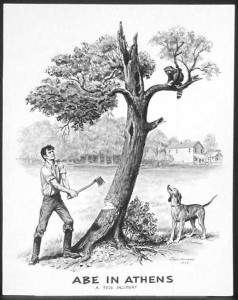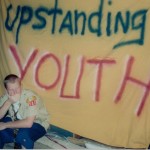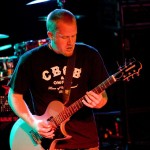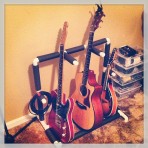Seth Godin, a popular author and blogger, recently wrote, “Just about every successful initiative and project starts from a place of replication. The chances of being fundamentally out of the box over the top omg original are close to being zero.” This reminded me of four things that seem unrelated, but I promise they are: John Locke’s definition of private property; my family trip to Palmyra, New York; the Foo Fighters newest album; and Sting’s new Broadway production. They’ve all taught me that being original isn’t about creating something from nothing, it has something to do with what John Lock said about private property many years ago.
Private Property
 John Locke in his Second Treatise defines private property at length. To summarize some of his great points, Locke says that one of the only things we truly own is the labor of our hands and when we add our labor that of a natural resource, that is when private property is created. When we take something from it’s common state of nature (think of stuff like natural resources or any pre-existing material or even pre-existing ideas) and change it or manipulate it with the labor of our mind or hands, that is what he sees as private property. Yes, I understand that the concept Locke explains is much more complicated than that, but this brief definition will suffice for this blog post regarding originality.
John Locke in his Second Treatise defines private property at length. To summarize some of his great points, Locke says that one of the only things we truly own is the labor of our hands and when we add our labor that of a natural resource, that is when private property is created. When we take something from it’s common state of nature (think of stuff like natural resources or any pre-existing material or even pre-existing ideas) and change it or manipulate it with the labor of our mind or hands, that is what he sees as private property. Yes, I understand that the concept Locke explains is much more complicated than that, but this brief definition will suffice for this blog post regarding originality.
Being original doesn’t meant you created something from nothing. Originality means adding your labor to something that already exists and making it your own.
Family Trip to Palmyra, New York
I took my family on a road trip from Stafford, Virginia to Palmyra, New York earlier this year. Road trips do amazing things for me. My mind runs wild with music ideas, social media projects, and most of it is influenced by what I see along the trip. On our trip home we opted for a more scenic route through Pennsylvania. We drove home along highway 219 through areas we had never seen before. After countless miles of what seemed like endless forest, we climbed into a place called Ridgeway and the trees opened up to a small logging town. I was enchanted. I wanted to stop and talk to everyone, ask them how they made a living, ask them what brought them happiness or sadness lately. I just wanted to know those people because they seemed so interesting and unique from the rest of the world.
I thought to myself, how awesome would it be to spend a day asking people from this town two primary questions to get to know them, “what has made you really happy” or “what has made you really sad.” I believe those two questions are the quickest way to get to know someone. I could bring my guitar, play some songs, it’d be a blast. After a few days of talking with people I would have some great stories that I could turn into some great songs – a whole album about one town’s story. I could do this all over the country, all over the world! I could travel and use my traveling to write albums and tell the stories of other people. This felt so exciting because I’ve come to believe that some of the greatest songs are built on great stories. Not only that, I’ve grown tired of writing songs about my stories.
This idea felt like I could add my musical labor to the existing stories of people and make them my own.
Sonic Highways by the Foo Fighters
A few months after returning home from Palmyra, New York I saw the Foo Fighters announcement that they were doing a new project called Sonic Highways. They were going to travel to significant rock and roll cities, interview the bands that shaped rock and roll, and from those conversations they’d craft songs that would make an album. Here’s the original video I saw of Dave Grohl from Foo Fighters explaining his idea. http://youtu.be/Z1m7KLzzuk0
I wrote an email to my wife the day I heard about this with the subject like, “That S.O.B. Dave Grohl.” It sounded a lot like the idea I had while we drove on Highway 219. That S.O.B. Dave Grohl, he’s a genius.
The Foo Fighters were adding their musical labor to the existing stories of rock and roll and making those stories their own.
Sting’s Broadway Musical, The Last Ship
The musician known as Sting had a long bought of writers block and only broke it recently. Instead of writing an album, he wrote a Broadway musical. For those of you who don’t know Sting, he comes from the band The Police who had an amazing career of back-to-back hits and then he went on to a solo career that was very successful as well. Then it all stopped. Sting couldn’t write anymore.
He wasn’t able to break the writers block until he started thinking about the people and stories of his childhood. Sting started writing songs about the stories behind the people he grew up with and the shipbuilding town he desperately sought to escape.
When he finally gave voice to the stories that already existed in his life, he was able to create something amazing and powerful. He didn’t have to try to create something wholly original or new, just give life and a view of something that was already there. Listen to him explain it HERE.
By adding his musical labor to the stories of his childhood, Sting was able to make the stories of specific people his own. He created something “original.”
Being original doesn’t mean making something from nothing. Being original means seeing the work that’s already been done by others in a way that no one else does, adding your labor to it, and realizing that people will mistakenly see your work as being original.






Leave a reply